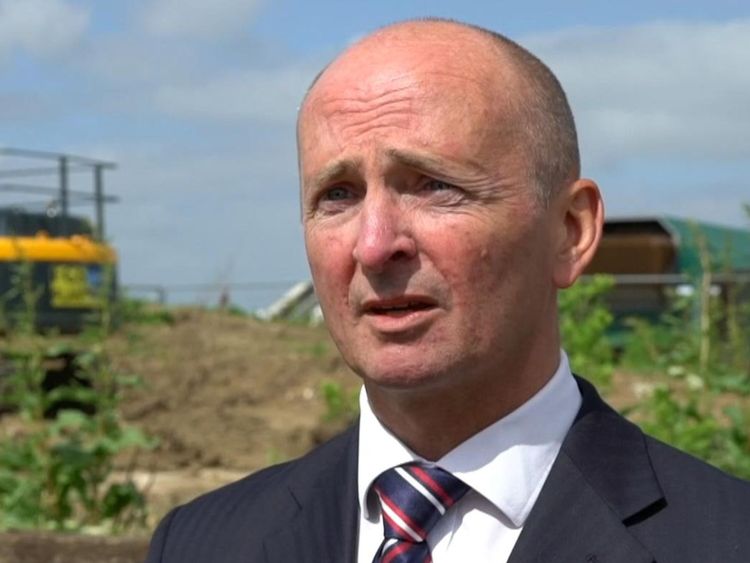Businesses are to be offered financial incentives if they employ ex-offenders under ambitious new plans being unveiled by the justice secretary.
The inmate education and employment strategy will give individual prison governors full autonomy to tailor their programmes to meet the needs of employers in their local area.
Prison officers have voiced concerns that recent staffing cuts will make it extremely difficult to supervise the programme in some jails.
Sky News was given access to HMP Standford Hill in Kent to see the new programme in action.
Inmates behind the wheel of diggers and dumper trucks were churning up the earth around the prison.
The prisoners were digging their way to freedom. But it was not an audacious prison break – the freedom they are after is escape from the cycle of re-offending, and re-incarceration.
In Kent, prison governor James Padley has determined that construction work is one of the main areas crying out for new recruits.
The inmates at Standford Hill are put through an intensive course, giving them certified qualifications to enter that work sector.
Mr Padley said: “If you give a man employment, you give him the ability to support himself, to clean himself, to look after his family.
“But you also give him self-esteem and you make him part of the society that he’s been away from.”
Omar Welsh is one offender benefiting from the new strategy.
A serial criminal, he has never worked a day in his life. But he has now passed several employment tests and obtained an LGV licence to help him enter the road haulage business.
He is full of praise for the help he has received and urged other inmates to make use of the programme.
“Until you do something positive to try to change your life around, you’re always going to be stuck in the same mould, doing crime and getting sent back to prison,” he said.
“You have to try and help yourself and do something to try to change yourself. Until you make that change, you’re always going to be in the same mess.”
Justice Secretary David Gauke said the strategy was aimed at putting offenders back “on the path to employment”.
As well as giving governors control of education and tailoring it to prisoners’ needs, employers will be offered a National Insurance Contributions holiday if they hire ex-offenders.
The justice secretary said it is hoped the strategy “will help to cut the £15bn annual cost of re-offending as ex-offenders in employment are less likely to commit further crime.”
At present, however, just 17% of offenders are in P45 employment a year after release.
A consultation on how to get more risk-assessed prisoners out of their cells and into real workplaces, while on temporary licence, is also being launched on Thursday.
A new body, the New Futures Network, will work side-by-side with employers to generate job opportunities.
Gary Rosewell, owner of Kent shipping company Total Ship Services, has done more than most to offer employment to ex-offenders, having hired 14 inmates from HMP Standford Hill over recent years.
He told Sky News: “All they need is help, a leg up to get back into society.
“If you release them with a few quid in their pocket and no prospects, what do you expect? I’m not condoning it, but that’s the vicious cycle these guys are in.
“They need business leaders to recognise that, intervene and give them another chance in life.”
Steve Gillian, general secretary of the Prison Officers’ Association, said while the scheme appeared to be a positive step forward, he has “serious concerns about its deliverability” because of significant cuts to prison staff numbers in recent years.
“There simply aren’t enough prison officers to supervise the training programmes in many prisons,” he said.
The Ministry of Justice said it acknowledged those concerns but pointed out that the Prison Service was currently on a major recruiting drive again.
A £100m recruitment programme hopes to have an additional 3,000 officers on prison landings across England and Wales by the end of the year.
But Steve Gillian said, even with those new recruits, the Prison Service would still have around 3,500 fewer officers than it did before the cuts in 2010.
From – SkyNews







